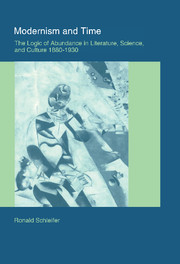Book contents
- Frontmatter
- Contents
- Preface
- Introduction:Post-Englightment Modernism and the experience of time
- PART I POST-ENLIGHTENMENT APPREHENSIONS
- PART II LOGICS OF ABUNDANCE
- 4 The natural history of time: mathematics and meaning in Einstein and Russell
- 5 Analogy and example: Heisenberg, linguist negation, and the language of quantum physics
- 6 The golbal aesthetics of genre: Mikhail Bakhtin and the borders of modernity
- Notes
- References
- Index
6 - The golbal aesthetics of genre: Mikhail Bakhtin and the borders of modernity
Published online by Cambridge University Press: 22 September 2009
- Frontmatter
- Contents
- Preface
- Introduction:Post-Englightment Modernism and the experience of time
- PART I POST-ENLIGHTENMENT APPREHENSIONS
- PART II LOGICS OF ABUNDANCE
- 4 The natural history of time: mathematics and meaning in Einstein and Russell
- 5 Analogy and example: Heisenberg, linguist negation, and the language of quantum physics
- 6 The golbal aesthetics of genre: Mikhail Bakhtin and the borders of modernity
- Notes
- References
- Index
Summary
But they were not alone, nor had they been from the start, from the start of love. Their time sat in the third place at their table. They were the creatures of history, whose coming together was of a nature possible in no other day – the day was inherent in the nature. Which must have been always true of lovers, if it had taken till now to be seen. The relation of people to one another is subject to the relation of each to time, to what is happening. If this has not been always felt – and as to that who is to know? – it has begun to be felt, irrevocably.
Elizabeth Bowen, The Heat of the Day (1962: 194–95)In this chapter, I examine Mikhail Bakhtin's early neo-Kantian analysis of aesthetics in relation to cognition and ethics in order to examine his conceptions of genre as central to ordinary discourse and verbal art. Bakhtin's conception of genre, like Russell's conception of order and Heisenberg's articulation of the meaning of quantum mechanics, is a response to the abundances of knowledge, materiality, and experience in the new century – a third logic of abundance, joining Russell's and Einstein's temporalization of sufficient reason and Heisenberg's temporalization of the law of contradiction.
- Type
- Chapter
- Information
- Modernism and TimeThe Logic of Abundance in Literature, Science, and Culture, 1880–1930, pp. 208 - 232Publisher: Cambridge University PressPrint publication year: 2000



